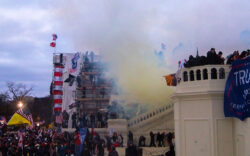“Georgia Joins the Movement” said the front page headline on the May 2 edition of The Red & Black, the campus newspaper at the University of Georgia here in Athens. On Apr. 29 police arrested 16 people who were part of a pro-Palestine protest on the university’s campus. A larger crowd of about 300 protesters later marched peacefully in solidarity with those who were arrested earlier.
Protests and rallies have exploded across America in the wake of war between Israel and Hamas that was sparked by the Oct. 7 Hamas terror attacks that killed 1,200 Israelis. The war rages in the Gaza area that is devastated by Israel’s military response, with 34,000 Palestinians dead. The current wave of protests has been compared to the turbulent times of the late 1960s and early 1970s in America, and today’s protests—like those of the past—inspire some while angering or frightening others.
Dissident movements are nothing new in America or on the usually calm campus of the University of Georgia. In April 1968, hundreds of UGA students occupied the school’s Academic Building demanding sweeping changes in the university’s antiquated policies regulating the dress and behavior of female students. The three-day UGA occupation preceded the Apr. 23, 1968 takeover of college buildings by protesters at Columbia University in New York, which again has become a focal point of protests over the current war in the Middle East. Students for a Democratic Society, a leading anti-war organization in the ‘60s, helped organize the 1968 protests at the University of Georgia, Columbia and other campuses as outrage over the Vietnam War brought millions of Americans into the streets.
The violence of war would come to an American campus in Orangeburg, SC in 1968. Police killed three African American students at South Carolina State College during a civil rights protest at the school. It was the first time that authorities had shot protesting students on an American campus. It would not be the last. In May 1970 students were again gunned down by National Guardsmen and police on the campuses of Kent State University in Ohio and Jackson State College in Mississippi. The two campus massacres within days of each other ignited a firestorm of revulsion and revolution across the nation at the time, and the University of Georgia joined that movement.
In the spring of 1970, some 3,000 University of Georgia students took part in a peace rally to protest the ever-widening Vietnam War and to memorialize the dead at Kent and Jackson. The size of the local rally showed the concern and commitment on campus in 1970. At the time, the university had an enrollment of just over 18,000—less than half its current enrollment of 40,000. The peaceful protest at UGA in 1970 was far larger than dissident actions at UGA today. An iconic photo from the time shows the university’s legendary Dean of Men William Tate in the crowd at the Athens protest, wearing “hippie love beads” along with the tie around his neck.
1968 was a tempestuous time in the United States and here in Athens. Angry protests erupted across America and locally in the aftermath of the assassination of civil rights champion Martin Luther King Jr. on Apr. 4, 1968. Two months later Robert F. Kennedy was assassinated during his anti-war campaign for the presidency. At the 1968 Democratic convention in Chicago, police and protesters clashed in the streets of the Windy City while crowds chanted, “The whole world is watching.” In November 1968, Republican Richard Nixon was elected president, and the war dragged on while peace activists were brought to trial.
One of those indicted activists was Dave Dellinger, a longtime peace and civil rights crusader who spoke here in Athens during the Vietnam War and at later local events in the ‘80s and ‘90s. Dellinger was “a rebel without a pause” until his death in 2004 at age 88. “I learn more from young people than they learn from me,” said the old activist after one Athens appearance.
Protest movements have shaped American history. Writer Oscar Wilde spoke truth when he said, “It is through disobedience that progress has been made, through disobedience and through rebellion.”
Like what you just read? Support Flagpole by making a donation today. Every dollar you give helps fund our ongoing mission to provide Athens with quality, independent journalism.










